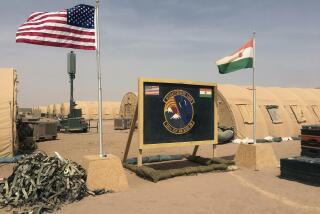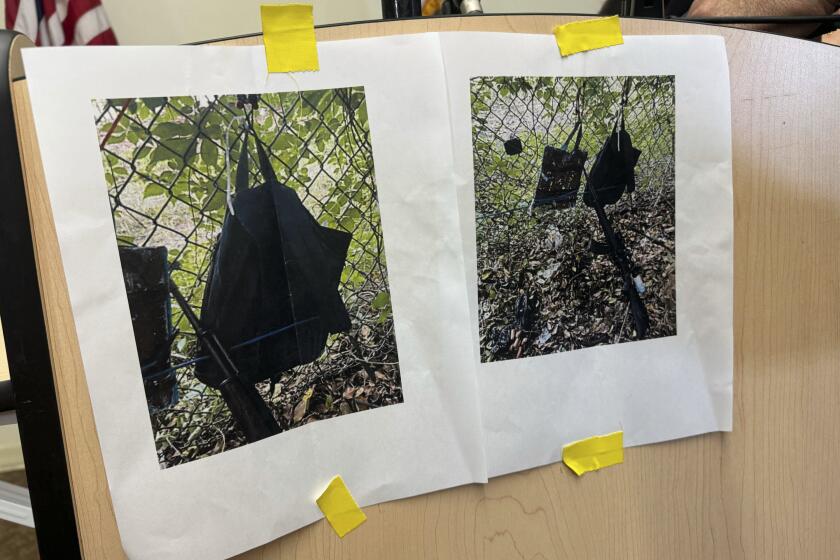Opinion: Sure, Boko Haram is bad, but don’t overlook Nigeria’s corrupt ways
It’s a nasty business, this abduction of 270 teenage girls in Nigeria by the Boko Haram terrorist group. But should dealing with these terrorists be our business too?
The White House said Tuesday that it was, at least a little bit. The U.S. is sending military, intelligence and law enforcement advisors to Nigeria to help that country find and, hopefully, rescue the kidnapped girls. This after Boko Haram’s leader threatened to sell the girls as slaves.
President Obama, who’s had more than a few international crises on his plate lately, had this to say (as reported by my colleagues Christi Parsons and Robyn Dixon):
“ ‘You’ve got one of the worst regional or local terrorist organizations in Boko Haram in Nigeria,’ he told ABC News. Obama said the Islamist group had been ‘killing people ruthlessly for many years now’ and that the mass abduction of the students might help ‘mobilize the entire international community to finally do something against this horrendous organization.’ ”
OK, yes, they’re nasty folks. I’m with you there.
But here’s the flip side: Boko Haram may indeed be a “horrendous organization,” but it didn’t just spring up for no reason to kill innocent people, kidnap innocent girls and taunt Nigeria’s government and the world community.
In a prescient op-ed for The Times in March, writer Sarah Chayes talked about the connection between insurgencies and corruption, using Nigeria as one example.
Chayes, a a senior associate at the Carnegie Endowment for International Peace, wrote about Nigeria’s president, Goodluck Jonathan, and how he had sacked the country’s central bank governor, “who was trying to discover what had happened to an estimated $20 billion that disappeared from the nation’s oil revenue over an 18-month period.”
As she wrote:
“Corruption, in other words, has security implications.
“Nigeria, Africa’s largest oil producer, exemplifies some of them. For months before his ouster, the central bank governor, Lamido Sanusi, had been denouncing the gap between the sales price of exported oil and the amount of money that actually reaches government coffers. Most of the missing billions are believed to have been diverted to the pockets of the president and his cronies — with the help of the oil minister, who keeps the accounts.
“As one Western official in the capital, Abuja, put it in November: ‘The oil minister is Jonathan’s ATM.’ ”
Chayes described Nigeria’s corrupt ways — from the highest levels of government down to the local police forces and even the schools, where bribes must be paid to gain entrance or even good treatment by teachers — and concluded: “Many Nigerians suggest the emergence of Boko Haram was in part a reaction to this systematized corruption.”
So, that’s the unseen, dirty part of this whole business. No one would argue that what Boko Haram has done should be tolerated. Certainly the group’s tactics, even if they are a response to corruption, have no place in the modern world.
But we also need to separate emotion from facts on the ground. Otherwise, as Chayes noted even before this latest atrocity:
“ ‘Secretary of State John F. Kerry recently condemned the ‘unspeakable violence’ of Boko Haram militants before announcing increased counter-terrorism assistance for Nigeria’s government. As so often when confronted with extremism, U.S. decision-makers have allied themselves with the corrupt government and abusive security services.
“Missing from Kerry’s statements was any criticism of the suspension of the central bank governor or of the vast official theft of oil money, a crime that affects all Nigerians and may be providing fodder for the very extremists U.S. leaders would like to help eradicate.”
I hope they rescue the girls. I hope no American lives are lost in the effort. I hope no innocent lives are lost in this affair.
But we shouldn’t forget that the government of Nigeria isn’t exactly innocent in this either.
More to Read
A cure for the common opinion
Get thought-provoking perspectives with our weekly newsletter.
You may occasionally receive promotional content from the Los Angeles Times.











